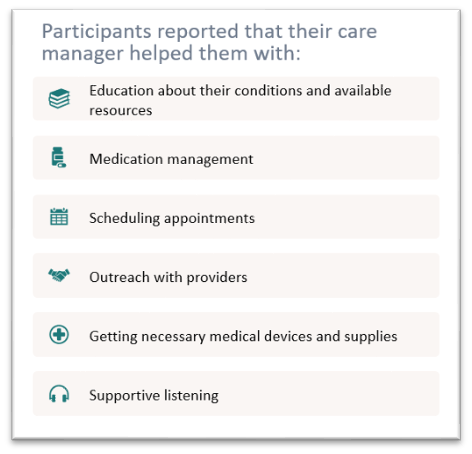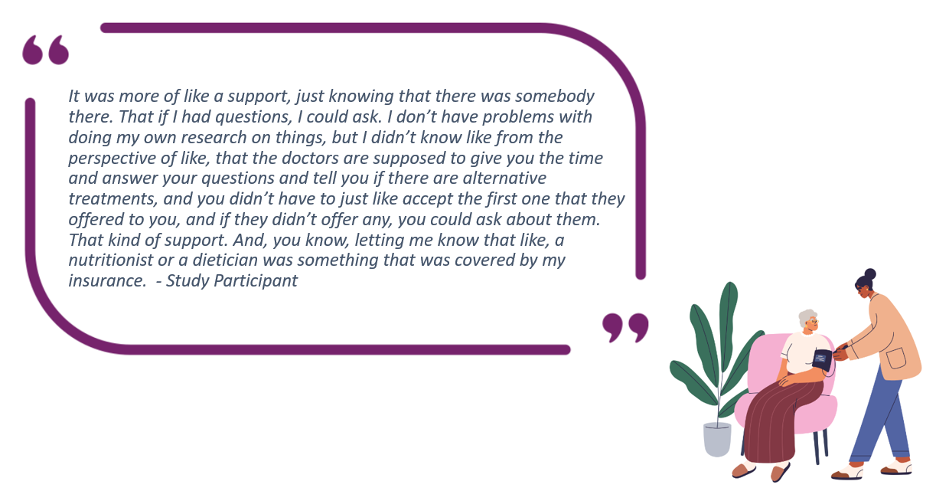We pride ourselves on being a solutions-driven team.
The UPMC Health Plan Community Team seeks solutions to managing complex health needs of members and knows first-hand the importance of being innovative and determined member advocates. This skilled team of nurses and licensed social workers was created over a decade ago to manage complex care and to help members develop solutions to overcome barriers to care and everyday life stressors. We are beside our members every step of the way, tackling challenges, developing patient-centered solutions, connecting with resources, and, sometimes, just taking the time to listen and provide positive and caring support through difficult times.
In the last blog post, Barriers to Integrated Care for People Living with Multiple Chronic Conditions (MCCs), we listed challenges that can prevent people from accessing care, especially people managing multiple, complex, and chronic health conditions. Sometimes, health care providers label patients as “noncompliant” if they do not, for example, use the C-Pap machine to help manage their sleep disorder or check their blood sugar levels routinely to avoid diabetes-related conditions. Unfortunately, providers default to the assumption that the patient is unwilling or uninterested in taking care of themselves.
What’s at the root of “noncompliance” and what can we do about it?
It is critical that providers look to the root of “noncompliance” and consider the circumstances that make filling a prescription or getting a colonoscopy the last thing on a person’s list of things to do. This “noncompliance” does not mean that they do not care about themselves or don’t want to feel better! Often what it means is that a person is just trying to make it to tomorrow, stay safe, and take care of their family the best they can.
Our UPMC Health Plan Community Team has identified some of the root causes for patient “noncompliance” and has adapted our outreach strategies and redesigned health services to better meet the needs of our members. We’ve learned that some of the seemingly simple interventions that our care team provides have made a positive impact for many members. For example, we have provided cab slips or bus tickets that allow a member to meet with their providers for treatment and receive necessary prescription medications. We offer support to members in completing paperwork for housing arrangements, which may result in greater stability that allows that person to prioritize their health and well-being. Our team connects members to employment or disability resources as appropriate. Assisting our members in securing a stable income and other vital benefits may mean that they can more comfortably afford to pay for their utilities or feed their pets. We make referrals to caregivers and other community resources, which provide supports to help allow our members to live as independently as possible. These are just a few examples of the impactful services that the UPMC Health Plan Community Team provides to help patients in our communities across Pennsylvania overcome “noncompliance.”
What we have learned over the years is that at the root of compliance is the simple fact that human beings need each other and should not have to face their problems alone. When our members lack supports or resources, the UPMC Health Plan Community Team is there to help them through challenging times in their lives.

Meeting people where they are is among the most powerful tools in our toolbox.
As our program grows and evolves, we have developed new innovative interventions and outreach strategies, offering multiple solutions to help members address their unique issues and reach their goals. Traditionally, we have met with members face-to-face in their homes or the community. While developing a personal relationship with members is key to our success, we have found ways to utilize technology to assist our members, expanding our reach throughout rural communities and providing flexibility for members who do not have the time to meet in-person with a care manager.
What happens when you can’t physically meet people where they are?
During the unprecedented COVID-19 pandemic, the UPMC Health Plan Community Team faced unique challenges because of quarantine. Fortunately, we had many tools at our disposal to help us help our members and each other. Thanks to our newly acquired virtual telehealth skills and knowledge, we were able to complete virtual meetings with members and providers. Without skipping a beat, the Community Team went into action utilizing telehealth, conference calling and remote monitoring text message check-ins, to name a few strategies. Our members continued to have the same needs and some even more uncommon issues due to the quarantine restrictions. While we could not visit members in their homes, we dropped off blood pressure cuffs on porches, taught members how to manage their diabetes virtually, coordinated benefits, arranged transportation and telehealth visits with PCPs, assisted with installing UPMC smartphone apps to help members manage their health care needs remotely, and even completed medication reviews that included pharmacists for medication compliance via video calls.
And so, as the pandemic raged on, the Community Team marched on! Thanks to innovative technology, determined staff, and a strong commitment to providing community-based services, our members continued to benefit from the interventions of the Community Team. Without us and our interventions, our members would have likely experienced a greater negative impact from the pandemic’s quarantine restrictions. The Community Team followed their cases nearly as effectively as before the pandemic, and today, our programs are even stronger, more effective, more efficient, and more responsive to our members’ needs than ever before. Our commitment to serving our Health Plan members is our priority, and our approach to providing services and supports is more diverse and innovative than ever.

Learn more about the UPMC Health Plan Community Team.
Interested in learning more about the Integrated Care Study? Our final study results will be published in 2025 – until then, stay tuned for the next installment of our Integrated Care Study Blog Series.